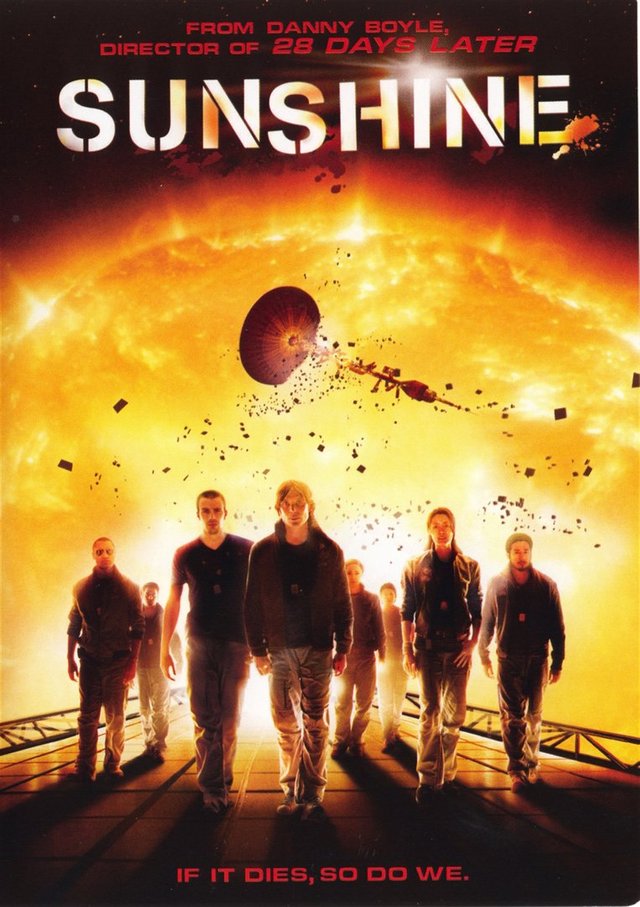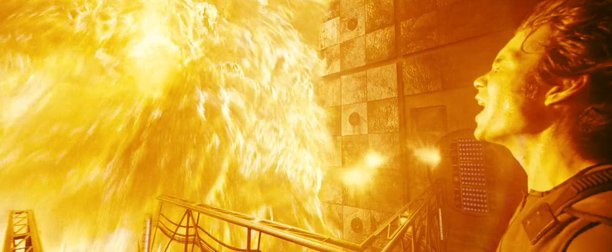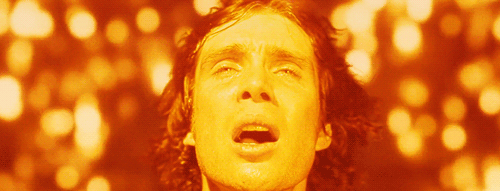SPOILERS AHEAD: This is film theory, intended to discuss the philosophical context of film. Therefore, critical plot points will be put under a microscope.

Directed by: Danny Boyle
Written by: Alex Garland
Plot Synopsis: Icarus II is the second mission attempting to reignite a dying Sun. They are Earth's final hope. On their way to dropping their payload, an atomic bomb the size of Manhattan, they discover Icarus I, the failed first mission.
"You and the darkness are distinct from each other because the darkness is the absence of something, it's a vacuum. Total light envelopes you. It becomes you. It's very strange. I recommend it."
Early on, while the crew eats dinner, the psychiatrist on board, Searle, preaches the very essence of "Sunshine."
The audience is introduced to the crew while Searle describes a unique perspective on the relationship between light and dark, one that may only be known by those so close to the Sun.
Just prior to his discussion, Searle is in the observation room, pushing the limits of how much light from the Sun he can see without going blind. There is an intensity, a rush he feels as he strains to hold his gaze, and satisfaction afterwards as the onboard computer readjusts the filter. It's as almost if he's getting high off of the sunlight.

As the film goes on, the psychiatrist's obsession with the sunlight is apparent, by the end of the film he is burnt, peeling, never out of reach of a pair of sunglasses. There's a level of infatuation the audience should note. It's no coincidence that Garland wrote the character, whose supposed to maintain the sanity of the crew, to be an obvious addict of light. There's something in the light, that can be understood with reason and logic, that's beyond or within the Sun. To know and discover is to continuing gazing into it.
As much as the plot of Sunshine is about saving life on Earth by reigniting the Sun, it focuses much of its theory on death. The most obvious statement about death the film stresses is how life dies at the hands of light, that death is the return to light, and death is to become the light. All the characters in Sunshine die, either of overexposure to sunlight or some other means, and all return to a state of dost because of sunlight. The essence of the philosophical statement regarding death is that we return to the state from which we evolved, "Stardust to stardust" as the capiton of Icarus I plainly states.
Because the film talks about death, it ingeniously, and by necessity, enters the realm of theology. Pinbecker, the capitan of Icarus I takes on the role of the overzealous cult leader, having the entire crew drink the kool-aide through methods of overexposure to sunlight. He proclaims himself, multiple times throughout the film and in different ways, religiously righteous.
Pinbecker's obsession with the light is hinted upon earlier in the film, but is confirmed when the crew of Icarus II boards the Icarus I. The onboard computer is turned on and a video message plays from Pinbecker's dairy, ominously describing how Icarus I chose to abandon the mission that would save mankind. The entire crew is found, piles of ashes, the observatory filter allowing all possible light into the room, hence the proverbial kool-aide.
"What happen?"
"They had an epiphany. They saw the light." Searle answers the question as if to some degree, understanding their reasons.
But why? Why would the crew be so willing to kill themselves knowing that they were killing humanity at the same time? There are many subtle clues that allow the audience to answer these questions.
The most obvious of these clues is Pinbecker's declaration for why he found the need to sabotage Icarus II, humanities last hope.
"For 7 years I spoke with God. He told me to take us all to heaven."
Searle's behavior enlightens the audience with the connection between the obsession with light and what lies within it, even if perceiving it means death. While Capitan Kaneda is dying by the hands of the light after repairing the damage to the shield that protects the crew, Searle is screaming, if not pleading for Kaneda to report what he sees while being physically and mentally drown by the tidal wave of light. "What do you see!?" he screams over and over. Pinbecker embodies this obsession with both light and death.
There are many questions one could ask from the short relationship the audience has with Pinbecker. First off, if he was alone on Icarus I for 7 years, and claimed to have talksd to God for the same period of time, who or what does he believe God is?
It's also worthy to note that Pinbecker can't be touched, any physical contact with another human being is painful for him.

The way he's portrayed on camera is quite intriguing, a phenomenal visual direction from director Danny Boyle. Pinbecker is always seen in a constant blur, as if he's lost his physical sense of self, or become more light than actual man, more mind than human.

The climactic point in Sunshine actually gives viewers a chance to see the light. As Capa successfully ignites Icarus II's payload, he witnesses the creation of a star before his eyes. The star within a star forms, and Capa is going to be swallowed by it's fire. As the surface of the new star races toward him, he screams in anticipation of the agony, but he opens his eyes to see that the surface is right before him stagnate, and but just an arms length away.

Capa is actually already dead in this scene. The purpose of it is to show the audience how a character who was, throughout the whole film afraid of his own inevitable death, embracing the light. As his eyes open to see the expansion of the light frozen before him, his facial expressions change from fear and pain to love and embrace. He becomes entranced by the light that's going to (although it already has) kill him. The scene ends as he reaches out and touches the sunshine in front of him, a symbolic gesture for the embrace of life after death
The closer the characters comes to the light of the Sun, the more enchanted by it they become. From a philosophical standpoint,the film is driving the audience to see the obsession and awe of such a powerful and potentially destructive force, because the closer they get, the clearer their vision of a life after death becomes. Heaven on the horizon.
But if this is the case, then why did Garland write the screenplay to save humanity, why not, as Pinbecker put it, "bring them all to heaven"?
Perhaps it's a statement of individual will, you cannot impose what you see in the light on those incapable (the rest of the human race back on Earth) of seeing it as you do. One cannot allow personal obsession, whether right or wrong, to turn into a God-view where a few dictate the future of the many.
What all the crew members saw in the light, the life of heaven, is real, verified by Searle psychiatrist, the man of reason and sanity. He saw the light and fell in love with it. But being the man of reason, he knew that the individual's own vision, faith., and belief couldn't jeopardize the fate of mankind.
And that brings us to a second philosophical conclusion, that life always remains. There's always life and always will be life, even when our bodies, this planet, or the Sun returns to dust. This is again evidenced in how Garland wrote the ending of the film with the success of Icarus' II mission despite all the obstacles and arguments against its success.
Every crew member who saw the light up close, the crew of both Icarus missions, died but found life in the return to light through death. And those on Earth, those incapable of seeing the glory and power of the light, found life in the success of Icarus II. Everyone, from whatever perspective they may have, finds life in the light.
Sunshine is a science fiction film that flies largely under the radar. And hidden under a relatively typical plot of a few to save the all, is a profound philosophy about the very nature of light, life, and death as well as the role of one man fighting for the survival of the species.
The core theory of the film goes back to Searle's comments at the beginning of the movie. In that our lives depend on the light, we will eventually die by the light, and we will, in death, become the light, because we are light.
The darkness is empty, a vacuum, nothing, nonexistence. The light is being, the creation force of life.
Cool! I follow you.
Downvoting a post can decrease pending rewards and make it less visible. Common reasons:
Submit
Congratulations @thehour-hand! You have received a personal award!
Click on the badge to view your Board of Honor.
Downvoting a post can decrease pending rewards and make it less visible. Common reasons:
Submit
Congratulations @thehour-hand! You received a personal award!
You can view your badges on your Steem Board and compare to others on the Steem Ranking
Vote for @Steemitboard as a witness to get one more award and increased upvotes!
Downvoting a post can decrease pending rewards and make it less visible. Common reasons:
Submit